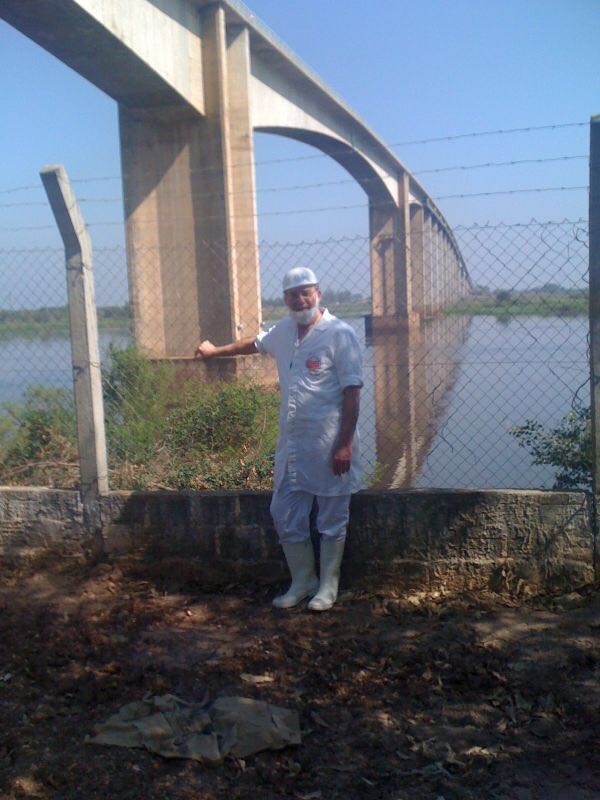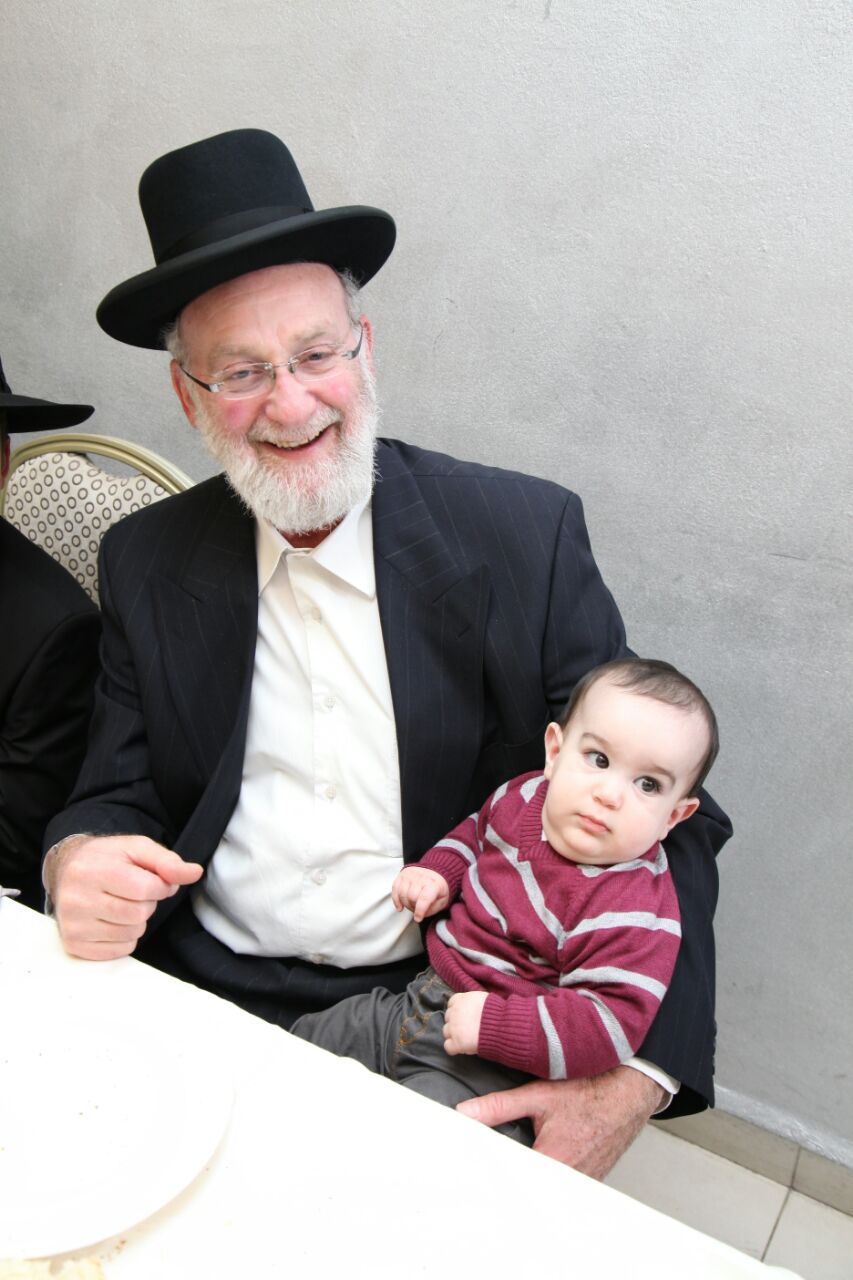"We Travel to the End of the World to Ensure Your Meat is Glatt Kosher"
What do the approaching High Holidays signify to you? For hundreds of shochtim, it means hard work to provide you with the most kosher and prestigious meat. So how do they manage to leave home and family to travel to slaughterhouses at the world's end? How do they defend against antisemitic attacks? And what do they do when there is no glatt kosher food in the area? We ventured to gain insight into the lives of the shochtim.
 Rabbi Ezra Rapho
Rabbi Ezra RaphoThe month of Elul is nearly upon us, and with it comes the pressure on meat importers to supply all their goods as the holiday season approaches; a time considered to elevate meat sales to new yearly highs.
Rabbi Chaim Vardi, the rabbi for 'Adom-Adom' at Tnuva, who travels abroad from time to time following rabbinical directives, notes that when discussing ritual slaughter, most of it takes place abroad in countries like Argentina, Uruguay, Paraguay, and in recent years, also in Europe.
"The reason that there is a need to import such large quantities of meat," he says, "is because not enough animals are raised in the country for slaughter, and even though live cattle are imported from certain areas of Europe and even from Australia and slaughtered domestically, it still doesn't meet the full demand. Hence, there has been a very extensive slaughter industry abroad for many years."
Also, Rabbi Ezra Rapho, who served as the head of the overseas slaughter department in the rabbinate for about 17 years, claims that it's a thriving industry. "There is a very high demand for meat in the country, and approximately 70% of the meat offered to consumers comes from abroad. That is also why about 800 shochtim travel across the globe."
Milking the Cows, Sustaining on Sheep
As Rabbi Vardi recounts, the shochtim usually travel in groups of 10 to 15 people. "They often stay in apartments or lodging houses prepared for them in advance. Most hours of the day are spent at the plant, but they also have Torah lessons and prayer services."
In a conversation with R' Rafael Khodorov, a shochet traveling abroad for work for about two decades, we learn that generally, the physical conditions in the slaughter areas are good, except for one aspect - food. "The plants we reach are almost always far from any settlement, and then we face significant kashrut challenges concerning our nutrition," he explains.
 Rabbi Chaim Vardi, Rabbi of 'Adom-Adom' at Tnuva
Rabbi Chaim Vardi, Rabbi of 'Adom-Adom' at TnuvaAccording to Khodorov, they never have an issue with meat because, although kosher meat is not marketed there, they use the meat they slaughter at the plant. "I once worked at a plant where we only slaughtered sheep, and for four months, we found ourselves subsisting daily on lamb."
However, he does note a significant shortage in dairy products. "In the areas where we operate, there aren’t usually Jewish communities, so obtaining kosher dairy products is not possible. Sometimes it's possible to order milk through deliveries, but the costs are exceptionally high. So we taught ourselves to milk the animals by hand, boil the milk, freeze it to prevent spoilage, and use it as needed. Some shochtim even know how to make cheese from it."
One year, Rabbi Khodorov recounts, he was part of a team working in a very remote area in Chile. "The place was called ‘Sin del Mundo’—Spanish for 'End of the World,’ and indeed, it was far from any settlement. There were officially no kosher products there, not even wine for Shabbat, so we went out to the local markets to search for grapes. Fortunately, the area had plenty of fish, as it was located on the ocean's edge, so we mainly relied on salmon."
Out of Sight
But the food issue is not the only challenge the shochtim face, as due to the vast distance, they often work for long months without returning home, far from their families.
And here lies perhaps the most difficult point. "To reach, for example, the plant in Sin del Mundo, we had to travel for more than a day," Rabbi Khodorov recounts, "We flew to Spain for four and a half hours, then another 13 hours to Chile, followed by a four-hour drive. Add the waiting time between flights, and it totals more than 24 hours. That’s why it was no surprise that they didn’t approve our return home throughout the entire slaughter season, which is four months."
And it's definitely not easy for the shochtim. As Rabbi Khodorov reflects on the past year, he notes that it’s hard to find a whole month where he spent uninterrupted time at home. "Last year, I traveled three times, each time for two consecutive months, and another two times, each lasting two weeks, as these were slaughters in Poland, which is closer to the country."
"Indeed, that's how the work of the shochtim is done," agrees Rabbi Rapho, "shochtim around the world are forced to leave home and family for extended periods, arriving at plants for 'seasons'—each lasting several months, and throughout that time, they almost never see home. Though sometimes, they take a break mid-season and return home, or alternatively, they may invite their wives to visit them, but it’s still challenging."
 Rabbi Chaim Vardi with his grandson
Rabbi Chaim Vardi with his grandsonAnd Rabbi Khodorov adds: "You also must understand that despite the distance, we must continue running the house, connect with the banks, pay bills, talk to the children’s teachers, and so on. The problem is that the overseas hours differ from the country's hours, so there are days when all the shochtim wake up at three or four in the morning to call home and talk to whoever's needed, and only then do they go out for the slaughter work at the plant. Simply, there's no other time to make these calls."
But if this seems tiring, or maybe even impossible, you'd be surprised to hear that years ago, it was even harder. "Back then," Rabbi Khodorov says, "to call home, we had to go to the post office with a small office where we waited in line, requested special permission, and only then could we call, and we had to finish quickly because each minute cost five dollars. Not to mention that this call was only possible at certain hours of the day."
And Rabbi Rapho experienced firsthand the difficulty: "Years ago, I traveled on behalf of the rabbinate to Argentina, and I recall that the saddest moment each week was on Friday night after Kiddush. Each shochet would remember how at home they bless their children and grandchildren, and here they are alone. You could feel the pain in the air."
And he also notes: "Naturally, the shochtim miss quite a few events due to the great distance. For instance, I know of a shochet whose brother passed away, and he knew he wouldn’t make it from South America for the funeral, so he sat shiva in the foreign land. In another case, a shochet insisted on returning home for an event, but in the end, he arrived at the airport on a Friday just before Shabbat, ending up stuck at Ben Gurion Airport, and these things happen endlessly."
Antisemitic Incidents
And there are also antisemitic incidents in the plants where the shochtim are employed. Apparently, the mere presence of a group of Jews in an area otherwise populated only by gentiles stirs well-known hatred. That led to one day when Rabbi Khodorov and his colleagues woke up to find their room windows shattered and a swastika sprayed on the wall. The next day stones were thrown into their room, and they decided not to remain silent. They approached the plant owner, who indeed assigned them a guard for an indefinite period.
Rabbi Vardi, too, recounts a similar incident: "Not long ago, I was in a plant in France, and police came to guard us daily and escort us to the synagogue, due to a very high tension and no one was willing to take any risks."
And Rabbi Khodorov points out that in many places worldwide, people mistakenly think they are Muslims. "I once ventured to a slaughter in China, and when the Chinese saw me, they asked if I was a Muslim. At first, I tried to explain that we are Jews, but at some point, I realized the best approach in our situation was to simply affirmatively nod, so for weeks, they believed we were Muslims..."
However, precisely because they were surrounded by so many gentiles, Rabbi Khodorov mentions they were astonished one day to meet a local woman near the distant plant who asked them, "Who are you?" When they replied they were Jews, she was moved: "You remind me of my grandfather; I have a picture of him dressed just like you." She parted from them, and the next day she appeared at the plant's gates with her grandfather's picture showing she was indeed a Jewess. They connected her with the local Chabad house, and she eventually immigrated to Israel and married according to the law of Moses and Israel.
"Who knows," Rabbi Khodorov says with emotion, "if we weren’t required to venture to that area, we wouldn’t have found the opportunity to meet that woman and stir her Jewish spark."

